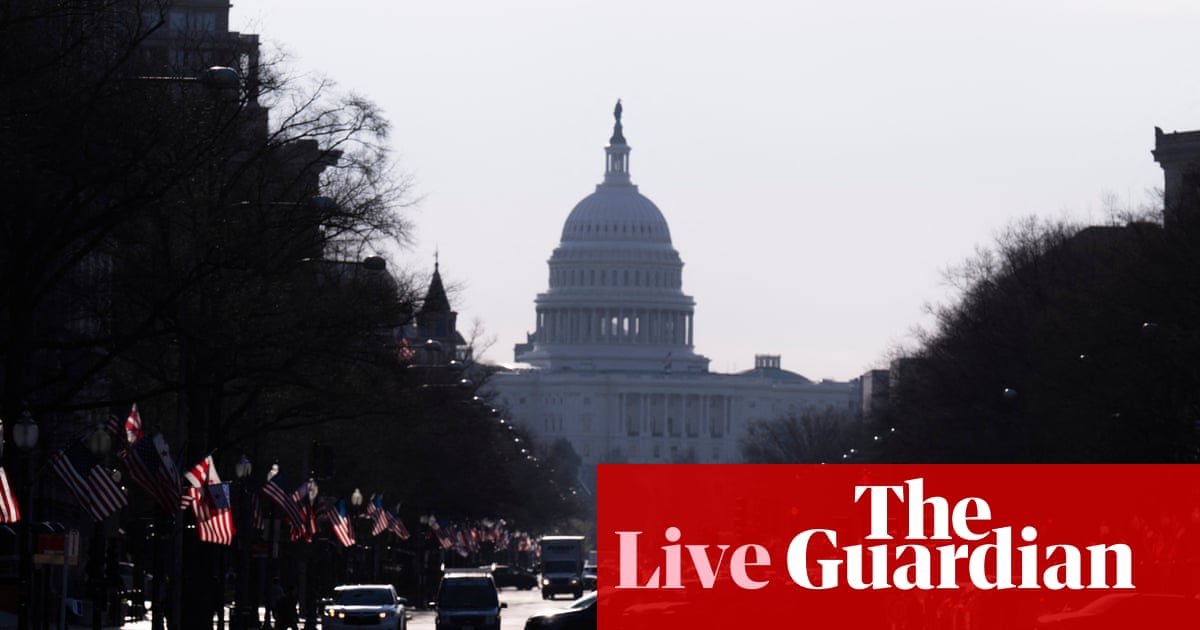Democrats lambast Trump over tariffs and weak jobs report, accusing him of ‘killing jobs and jacking up prices’ – US politics live | US news
‘Killing jobs and jacking up prices’: Democrats lambast Trump over tariffs and weak jobs report
Democratic lawmakers have slammed Trump’s “reckless and chaotic” tariff policies and federal cuts after today’s weak jobs report revealed that 258,000 fewer jobs were created in May and June than previously thought.
Senate minority leader Chuck Schumer said on X:
The chickens are coming home to roost for Trump, and American families are paying the price. His reckless and chaotic tariffs and his drastic cuts are catching up with the economy which means fewer jobs and more people out of work. Trump must end his trade war and reverse his horrible cuts now.
California governor Gavin Newsom wrote:
A July jobs report way below expectations. May and June revised down as well. Unemployment rate ticked back up to 4.2%. We haven’t seen conditions like these since 2020. Don’t let Donald Trump gaslight you. He is failing Americans and crashing our economy.
Kathy Hochul, New York’s governor, said:
Donald Trump is killing jobs and jacking up prices with his tariffs. Sellout Stefanik calls his leadership a “masterclass.” I call it bullshit. We will fight back.
Senator Chris Murphy, of Connecticut wrote:
Unsurprising bad jobs report. Just 73,000 added in July, and most of those were health care. Even worse, May and June jobs numbers revised down by 258,000. Awful. Companies don’t want to create jobs in Trump’s chaos economy with weakening rule of law and rampant corruption.
Representative Richard Neal, of Massachusetts, said:
The American people didn’t ask for this. Hiring has stalled, prices are surging, and this administration is actively undermining the labor market Democrats rebuilt. This goes beyond failed Republican leadership, it’s actively making life harder for people.
Key events
Wall Street opens with a fall
Graeme Wearden
The main US stock indices have fallen sharply at the start of trading, as investors react to the flurry of tariffs announced last night and today’s weak US jobs report.
The Dow Jones industrial average (which contains 30 large US companies) has fallen by 1.1% at the start of trading, shedding 501 points to 43,629.
The broader S&P 500 index is down 1.2%, while the tech-focused Nasdaq has lost 1.5% – with Amazon falling almost 7% after issuing disappointing forecasts last night.
Switzerland facing higher tariff because it did not drop trade barriers, White House says
The Swiss government is disappointed by the US tariffs imposed on Switzerland, president Karin Keller-Sutter has said, with the shock 39% figure much higher than expected – and one of the highest rates for any country.
“The Federal Council is disappointed,” Keller-Sutter told Reuters on the sidelines of a Swiss national day event in Ruetli. “It is a pity that there is a tariff that is much higher than what we negotiated.”
Although the pharmaceuticals sector was not included in the tariffs, the increased duties would have a “very bad” effect on the Swiss economy, she said.
The government has already been in touch with Washington to find a solution, she added.
The White House said on Friday that Switzerland is facing a higher 39% tariff rate on its exports because it refused to make “meaningful concessions” by dropping trade barriers with the US.
“Switzerland, being one of the wealthiest, highest income countries on earth, cannot expect the United States to tolerate a one-sided trade relationship,” a White House official said.
Mark Carney ‘disappointed’ by Trump raising tariffs on Canadian goods to 35%
Here’s more on Canadian prime minister Mark Carney’s comments from earlier, when he said Ottawa is “disappointed” by the US decision to raise tariffs to 35% on Canadian goods not covered under a pre-existing US-Mexico-Canada free trade agreement.
The US application of the USMCA treaty “means the US average tariff rate on Canadian goods remains one of its lowest for all of its trading partners”, Carney said.
“Other sectors of our economy – including lumber, steel, aluminium, and automobiles – are, however, heavily impacted by US duties and tariffs,” Carney said. “For such sectors, the Canadian government will act to protect Canadian jobs, invest in our industrial competitiveness, buy Canadian, and diversify our export markets.”
He also criticized Trump’s justification for raising the tariffs. “Canada accounts for only 1% of US fentanyl imports and has been working intensively to further reduce these volumes,” Carney said.
Trump has long complained about a “flood” of fentanyl” coming from the north. He also said earlier this week that it would be “very hard” to make a trade deal with Canada after Carney’s announcement that he plans to join other countries in recognizing a Palestinian state.
“Canada will be our own best customer,” Carney went on. “We can give ourselves more than any foreign government can ever take away by building with Canadian workers and by using Canadian resources to benefit all Canadians.”
Here’s Carney’s full statement:
Trump again demands interest rate cut as dollar falls after weak jobs report

Graeme Wearden
Donald Trump has again repeated his plea for the Federal Reserve chair Jerome Powell to cut interest rates.
Shortly after today’s weak jobs report was released, Trump posted on his Truth Social site:
Too Little, Too Late. Jerome “Too Late” Powell is a disaster. DROP THE RATE! The good news is that Tariffs are bringing Billions of Dollars into the USA!
The US dollar is being hammered on the foreign exchange markets, following the news that employment growth across America has been much weaker than previously thought over the last three months – a sign that the US labor market may be cooling.
The latest non-farm payroll, just released, shows that US employment rose by just 73,000 in July, rather weaker than the 110,000 new jobs expected.
But the big shock comes in the latest revisions to payrolls, with previous estimates for both May and June being revised sharply lower.
The Bureau of Labor Statistics now estimates that just 19,000 new jobs were created in May, 125,000 fewer than the 144,000 previously estimated.
June’s data has been revised down too – showing that just 14,000 new jobs were created, not the 147,000 reported a month ago.
That means 258,000 fewer jobs were created in May and June than previously thought.
The US unemployment rate has risen to 4.2% from 4.1% in June.
This surprisingly weak data may be a sign that Trump’s trade wars, and the associated uncertainty, have cause more damage to the US economy than previously thought. There could also be an impact from cost-cutting Doge program pushed by Elon Musk.
Donald Trump’s envoy Steve Witkoff visits Gaza aid ‘death trap’

Peter Beaumont
Donald Trump’s envoy Steve Witkoff has visited Gaza today and been shown one of the controversial aid sites around which Israeli forces have killed hundreds of Palestinian people waiting for aid.
Witkoff, the US president’s special envoy for the Middle East, had earlier met with Israeli prime minister Benjamin Netanyahu amid mounting international horror over starvation in Gaza that follows months of Israeli-imposed aid restrictions.
The visit to the site in Rafah by Witkoff – a former real estate lawyer with no foreign policy or humanitarian background, who has also met Vladimir Putin on Trump’s behalf – was reported by a number Israeli media organisations and comes as Human Rights Watch on Friday described the aid sites run by the Israeli and US-backed Gaza Humanitarian Foundation – as “death traps” that had become the scene of regular “bloodbaths”. The UN has said almost nine hundred Palestinians have been killed by Israeli forces attempting to reach the sites.
According to the White House, the visit by Witkoff, accompanied by the US ambassador to Israel, Mike Huckabee, was aimed at finding ways to speed deliveries to Gaza. “The special envoy and the ambassador will brief the president immediately after their visit to approve a final plan for food and aid distribution into the region,” the White House press secretary, Karoline Leavitt, told reporters.
Trump on Thursday called the situation in Gaza “a terrible thing” when asked about comments from his ally and Republican US representative Marjorie Taylor Greene, who became the first GOP lawmaker to call Israel’s assault on the Palestinian territory a genocide.
“Oh, it’s terrible what’s occurring there, yeah, it’s a terrible thing. People are very hungry,” Trump told reporters when asked about Greene’s social media comments, while also saying Washington had given financial assistance to address the hunger crisis in Gaza.
The full list of Trump’s tariffs – from India to Taiwan
My colleagues have created a searchable table of the countries and the “reciprocal” tariffs they face.
The rates, which range from 41% for Syria to 10% for the UK, can be found in the table via the link below.
Stock markets fall after Trump announces new tariff rates on 92 countries

Graeme Wearden
A quick summary.
Stock markets in Europe and across Asia-Pacific countries have fallen after Donald Trump announced new tariffs on dozens of US trading partners.
Last night, as the latest deadline to reach deals approached, Trump signed an executive order imposing tariffs ranging from 10% to 41%.
Rates were set at 25% for India, 20% for Taiwan and 30% for South Africa ahead of the US president’s self-imposed deadline of 1 August for striking trade deals with countries worldwide.
Trump also extended the deadline for a tariff agreement with Mexico by another 90 days.
Share prices have weakened in response – with Germany’s DAX down 1.9% and France’s CAC losing 2.2%, as European stock markets fell to a one-month low.
Asia-Pacific stock markets were on track for their worst week since April, with Japan’s Nikkei 225 losing 0.6%,
South Africa’s stock market is now down almost 1.5%.
Canada’s prime minister, Mark Carney, said he was disappointed that Donald Trump was raising its tariffs from 25% to 35%.
And there was shock in Switzerland, which has been lumbered with a 39% tariff rate – which manufacturers fear will lead to job losses.
You can follow more on our business live blog:
Cambodia’s prime minister has praised the new tariff rate and said it is good news for the nation’s economic development. Prime minister Hun Manet said in a statement posted to Facebook late on Thursday night that “this is the best news for the people and economy of Cambodia to continue to develop the country.”
“The United States has decided to reduce the tax on goods imported from Cambodia to the United States by 19% (down 30% compared to the initial tax rate of 49%),” Manet wrote in a translation of the post.
This comes after Donald Trump had originally threatened a 49% tariff on Cambodia as part of his “Liberation Day” measures, but cut it to 36% last month.
India is engaged with further trade talks with the US, a source said on Friday. This comes after Donald Trump signed an order imposing a 25% tariff on New Delhi’s export.
“We remain focused on the substantive agenda that our two countries have committed to and are confident that the relationship will continue to move forward,” India’s foreign ministry said in a statement on Friday.
Previously, trade talks between Washington and New Delhi have been bogged down by issues including access to India’s highly protected agriculture and dairy sector.
Trump set steep import duties on dozens of trading partners, including a 35% tariff on many goods from Canada, 50% for Brazil, 20% for Taiwan and 39% for Switzerland, according to a presidential executive order.
Canada will be its own best customer, says Carney, after Trump imposes new tariffs on dozens of countries
Good morning and welcome to our rolling coverage of US politics as Donald Trump has signed an executive order ranging from 10% to 41% on imports from dozens of trade partners in his latest attempt to reshape the global economy.
The order applies to 68 countries and the 27-member European Union. Rates were set at 25% for India’s US-bound exports, 20% for Taiwan, 19% for Thailand and 15% for South Korea.
It includes an executive order to increase tariffs on Canadian goods imported to the US from 25% to 35%. He cited Canada’s failure to curb fentanyl smuggling across the border as a reason for why.
Canadian prime minister Mark Carney said in a statement that he is “disappointed” by the announcement, then said Canada accounts for just 1% of US fentanyl imports. Carney also said that Canada remains committed to the US-Mexico-Canada Agreement.
He closed the statement by saying that Canadians will be their “own best customer”. “We can give ourselves more than any foreign government can ever take away by building with Canadian workers and by using Canadian resources to benefit all Canadians,” it reads.
We’ll be bringing you all the developments on this story today. In other news:
-
World stock rates have fallen. Germany’s DAX index has dropped by 1.1% at the start of trading in Frankfurt, while France’s CAC fell by almost 1% and Spain’s IBEX lost 0.6% – even though Europe reached a trade deal with the US at the start of this week.
-
Historian Rashid Khalidi has cancelled plans to teach this fall at Columbia University in response to the school’s recent agreement with the Trump administration.
-
A federal judge has ruled against the Trump administration’s plans and extended temporary protected status (TPS) for 60,000 people from Central America and Asia, including people from Nepal, Honduras and Nicaragua.
-
The US dollar has hit its highest level in two months against a basket of currencies today. The dollar index has risen by 0.1%, on track for its seventh daily rise in a row.
